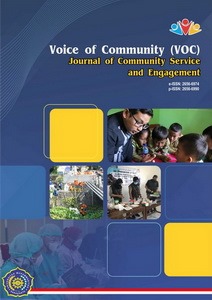Indulging the Taste Buds, Enjoying Pujan Kasanga: Developing Halal Gastronomic Tourism Based on Local Cultural Institutionalization
DOI:
https://doi.org/10.23917/voc.v4i2.5430Keywords:
Heritage, Culinary, Tourism, Halal, Pujan KasangaAbstract
The diversity of traditional Tengger cuisine tends to remain a personal consumption choice among the local community. Tengger gastronomy, which includes various rice dishes, corn, glutinous rice, spices, and coffee, can be packaged as a unique Tengger culinary experience, serving both as a gastronomic tourism promotion and an effort to introduce Tengger cuisine. Besides being souvenirs, Tengger's traditional foods can be enjoyed while admiring the natural landscape and scenery of Tengger. However, the local community lacks awareness of the potential diversity of their cuisine, preventing them from utilizing it optimally. The main issues addressed in this community service program are: (i) the limited capacity of the partner community's human resources to develop concrete and functional programs supporting tourism villages; (ii) the lack of knowledge and skills among the Tengger community regarding the potential of Tengger gastronomy; (iii) the low appeal of Tengger’s processed food souvenirs due to inefficient and non-eco-friendly packaging; (iv) the large number of traditional Tengger foods, cakes, and beverages that have not yet obtained halal certification; (v) the lack of effective techniques and strategies for marketing Tengger’s traditional food products. The implementation methods for this program include:(i) coordinating training schedules, locations, and related materials; (ii) conducting training in Tengger culinary processing; (iii) training in the packaging of Tengger’s processed foods; (iv) managing hygiene certification, intellectual property rights (IPR), and halal certification; (v) improving the marketing of Tengger cuisine through the Pujan Kasanga Festival and digital media. This program aims to empower the Tengger community by enabling them to utilize the resources around them, particularly in the field of gastronomy, to develop a creative economy.
Downloads
References
Sukmawan, Sony, dkk. (2022). Mendaras Puja, Mengemas Tamasya: Potensi Gastro-Sastra Wisata. Malang: Universitas Brawijaya Press (UB Press).
Alfian, Mohammad Rizqy. (2018). Pengelolaan Taman Nasional Bromo Tengger Semeru dalam Meningkatkan Pendapatan Tahun 2017. Universitas Brawijaya. http://repository.ub.ac.id/id/eprint/163356/1/Mohammad%20Rizqy%20Alfian.pdf.
Antonius, R. (2018). Gastronomi Makanan Betawi sebagai Salah Satu Identitas Budaya Daerah. Jurnal Hospitality dan Pariwisata, Universitas Bunda Mulia, Jakarta, 381-396.
Utami, Sri. (2018). Journal of Strategic Communication. Vol. 8(2), 36-44.
Addina, F.N, Santoso, and Sucipto. (2020). Concept of halal food development to support halal tourism: a review. IOP Conference Series: Earth and Environmental Science. https://iopscience.iop.org/article/10.1088/1755-1315/475/1/012053/pdf.
Liliweri. (2019). Pengantar Studi Kebudayaan. Bandung: Nusamedia.
Sagala, S. (2013). Memahami Organisasi Pendidikan: Budaya dan Reinventing Organisasi Pendidikan. Bandung: Alfabeta.
Downloads
Submitted
Accepted
Published
How to Cite
Issue
Section
License
Copyright (c) 2025 Sony Sukmawan, Sucipto Sucipto, Goerge Towar Ikbal Tawaka

This work is licensed under a Creative Commons Attribution 4.0 International License.








